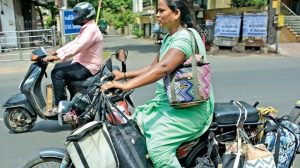People of Bharat: Meera, Mumbai

Meera sits tentatively on the edge of her seat. She takes up little space and wraps her arms protectively around an old plastic bag, guarding it close to her chest. Her thin frame is upright and a tad bit tense. We hear the steady hiss of rain outside. It has poured for over 36 hours; the traffic on the main road is a stagnant blur of red tail lights and impatient honks.
It is an hour past sundown. Meera and I are in my living room. “My name is Meera Ganpat Apte,” she introduces herself. As I pause to shuffle through a sheaf of papers on my lap, she reconsiders. “Make that Meera Sanjeev Deshpande. This is my husband’s name. I should give you this name,” she says.
“Did you just get married?” I ask, smiling at her little slip-up. “No,” she says, “I was married at 16, I am 26 now. My husband died and I didn’t live with him anyway.”
Meera came to Mumbai as a little girl. Her father worked at a book binding workshop in the city. Her mother followed from their village near Pune soon after Meera was born. “I grew up here, I have spent all my life here and my father has worked at the same press all his life” she adds. Meera lives with her parents and young daughter in a slum at one of the central suburbs of Mumbai. “My father owns the house we live in,” she tells me.
Growing up, Meera avoided school. “My family was supportive, they wanted me to study. But I dropped out because I could not follow the lessons”, she remembers. “I was not smart enough.” She tells me she was not good at sewing or at any other vocation either. So, she stayed back at home and helped with the chores till she was sixteen.
“My father was worried he wouldn’t find a decent match for me. So, when this one man came along, my father didn’t think twice”, she explains. Meera lived with her husband for a year. After a year, Meera and family decided that she had had enough of his rage, abuse and violence. Meera moved back into her parents’ house, this time with an infant daughter in tow.
“The first time I went looking for work was after I had had my daughter,” she recalls. She worked at a factory in the nearby industrial park. They manufactured car parts. Meera was one among the many workers hired to man the machines. She describes how she checked, tagged and tightened nut bolts for parts on the production line.
“My shift started at 8 in the morning and ended at 7 in the evening. They gave me Rs. 3000 a month” she shares. Meera quit work at the factory in 2016 after enduring years of long working days and meagre pay. That same year, she borrowed Rs. 5000 from her mother, started a tiffin delivery service and sourced her first customers.
“I had this idea”, she says reminiscing, “People would often ask me if I would cook for them. You know, single men and women who live here, have jobs and do not have time to cook. I could cook. I knew how to cook. I thought maybe I should give it a try.”
Her idea worked. She recovered her initial investment in the first month and was able to return the sum to her mother. A slight tinge of pride surfaces in Meera’s voice as she shares this bit of information.
These days, Meera caters for seven to ten customers on any given month. She takes all her payments in advance, in cash. “I charge Rs. 2000 per customer,” she shares. Meera delivers two meals a day to each customer, a basic dabba with bhaji, dal, rice and 5–6 chapatis. Most of her customers are young men who run shops or small workshops in the area.
Meera’s day starts at 6 am. She uses the early hours to cook for the first round of deliveries. By 10 am, she leaves with her cans of food to personally deliver dabbas to each customer. This takes a couple of hours and she is back home by noon. “So, I am home by 12 pm, then I rush about doing household chores and leave the house again to pick my daughter up from school,” Meera recounts.
Meera’s mother doesn’t keep too well. She has trouble contributing to housework, but she does drop Meera’s daughter to school each morning. “I do not have time in the morning to get my daughter ready. So, my mother takes care of that”,Meera shares.
The afternoons fly by fast, Meera bathes and feeds her daughter, there is laughter and chatter and by 4 pm her daughter is packed and dispatched for tuition to a neighbour’s house. Meera resumes cooking at 4 pm for the evening round of deliveries. By the time she finishes her second round of deliveries, it is nearly time for bed.
Meera manages her business entirely on her own. She needs at least Rs. 10,000 for supplies each month. Most months she makes a small margin, on others, she runs into net loss. “I borrow from my mother or from my friends to make up for losses” Meera says. So far, her arrangements have worked.
Meera hands over her entire cash income to her mother. “She takes care of my daughter, I owe her that,” she justifies. When in need, Meera borrows from her mother. She does not know much about her father’s finances. He commutes to the south side of the city for work every day. She is not sure of how much money he earns or — whether he has any savings. He is growing old. In years to come when he is too old to commute, he would not even a pension to support himself. He isn’t a government employee, after all. This thought has Meera worried.
I ask Meera if she plans on expanding her business. She says that she wants to but perpetually finds herself starved of cash. She says she realizes that infusing money into her business will probably help her improve her income but she does not intend to reach out to a bank or to any other form of lending institution. “I ask my friends for loans” she mumbles, “My father has always warned me against going to private lenders. So I do not do that. I have never seriously considered applying for a loan.”
Meera has had a savings bank account for years and there is a bank right around the corner of the lane in which she lives. “But I never went, I have never been inside a bank,” she says smiling guiltily; then sobers up and adds “I know having an account is important, but I just never have enough money to deposit. So, I don’t use my khata.”
Meera’s daughter is ten now. She goes to an English medium school. Meera paid Rs. 25,000 in admission fees and pays Rs.3000 a year now. A neighbour helps her child with homework. Meera shares that she feels an urgency to save money. She needs to pay for her daughter’s higher education, and must build a corpus for her marriage. “Every girl needs to be married off, my daughter will support herself with education but she still needs a husband,” Meera reasons. “We live on what we can manage. Some months I do not take my mother to see a doctor if we are short of money. My friends talk about this policy and that insurance, but I don’t think of any of that. We are very poor, Didi.”
I wind up as I find Meera getting restless and glancing at her phone. “Do you have a smartphone?” I ask. She turns the screen in my direction and says, “I don’t know, I have this”. “That is a smartphone,” I offer, “Do you use the internet?” I enquire.
“I only make calls, Didi. I really know nothing more about this device” she laughs and gets up. “May be I will do better, Didi, whatever I achieve will help my daughter,” she determines as I follow her to the door.
This research was developed as part of the Bharat Inclusion Initiative.
